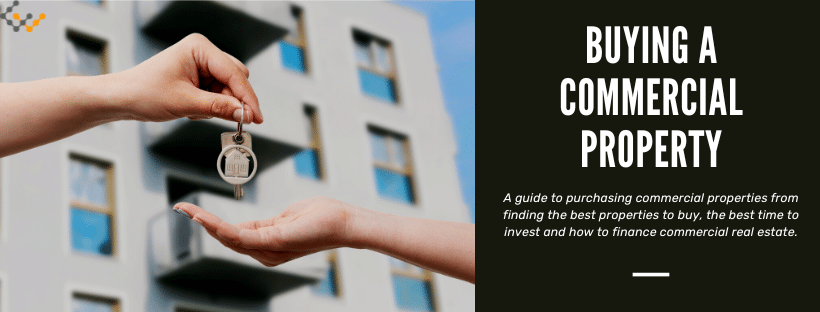What to Consider When Buying a Commercial Property?

Commercial real estate can be a profitable mid- to long-term investment, and it’s a good option when looking to diversify a portfolio. Whether heavy in bonds, equities or even smaller residential real estate, commercial properties offer exposure to different markets, stability during downturns in other markets, and some excellent opportunities.
Of course, it’s essential to purchase promising properties at advantageous properties. Here’s how to go about buying a commercial property, from finding to financing it.
Answer a few questions and get custom mortgage quotes. We'll match you with offers from our network of 650+ lenders.
What Properties are Considered Commercial Real Estate?
Commercial real estate includes a wide array of property types. They can be office buildings, retail stores and malls, industrial warehouses and factories, hotels and motels, banks and credit union buildings, automotive centers, and even special-use buildings like hospitals and some schools. Marinas, parking lots, fitness centers and stadiums are some other examples of what falls within the broad category of commercial real estate.
Multi-family residential properties, which are usually defined as having 5 or more units, are also considered commercial properties. Investors considering these should be aware that there are many loan programs specifically for various types of multifamily housing.
How to Find the Best Commercial Property to Buy: 6 Things to Consider
Finding the right commercial property requires careful analysis of many factors. Some details to consider when evaluating a potential property are:
Class: Commercial properties are commonly broken down into Class A, Class B and Class C. Class A represents the best buildings in the best locations. Class B is comprised of generally good buildings that might have one or two issues. They could need renovation, be older, or be in up-and-coming areas. Class C properties are usually older, distressed and/or in an undesirable location.
Determine what class you’d like to invest in, taking into account your experience, skill and investment goals. This should be determined early on, as it’s an easy way to narrow your search for a commercial property.
Type: The type of property has a major effect on leases, maintenance requirements, risk exposure, income and appreciation potential, and almost everything.
Consider what’s desirable in the general area where you’re looking to invest, what your investment goals are, what risks you can accept, and any specific experience you might have.
Location: Location is always most important when investing in properties, and that’s especially true when investing in large commercial properties.
Prime locations can command top dollar as Class A properties, or Class B properties. These can provide the most reliable revenue, however, and potentially strong appreciation. Secondary locations may afford more upside if you know what particular areas could be popular in a few years.
Condition: The condition of any property has a major impact on its price and value. Condition includes both the bones of a building and its aesthetics, as most businesses want to present a good image. Additionally, any major repairs or updates can become quite costly in a larger commercial building.
For the novice commercial real estate investor, a building in good condition that’s easily leasable may be best. Investors who have experience in commercial real estate may find good profits flipping more dated and distressed properties. Successfully doing this requires a knowledge of construction and contractor work, and also of the loan programs that can be used to finance repairs.
Tenants: The current tenants should be evaluated in at least two ways.
First, having one or two strong tenants can help attract others. This is especially true for retail investment properties, where many tenants are needed and large ones can drive foot traffic.
Second, make sure to check current tenants’ leases. It may be important to confirm that current tenants will remain in their spaces long-term, as this guarantees cash flow to cover operating expenses. If you intend to flip the property, though, you might actually want shorter leases that could be renegotiated.
Regulations: Don’t overlook the headaches that zoning laws and other regulations can cause. If a property isn’t already zoned for its intended use, the process of changing its zoning can be expensive and dragged out if local residents don’t want it changed. Intending to switch zoning can also limit what loan programs can be used.
Make sure to take any zoning restrictions into account when assessing risk, both in your valuation and in your investment plan.
How to Buy a Commercial Property: Step by Step Guide
Purchasing a commercial property is a bit different than purchasing a single-family home:
- Research and Planning: Begin with a clear understanding of your investment goals, budget, and the type of property you aim to purchase. This includes determining the type of property, class of property, and where the property can be located.
- Property Search: Utilize online platforms, network with industry professionals, and consider hiring a commercial real estate agent to find potential properties that meet your criteria.
- Property Evaluation: Conduct thorough assessments regarding the property’s location, condition, and market value. This is where expertise in the particular type of commercial property you’re looking at is needed. Hire professionals or partner with other investors if you’re inexperienced.
- Pre-Approval: Explore financing options, and become pre-approved with a lender that has a program which will work for you.
- Making an Offer: Once you find a suitable property, make a competitive offer, considering the market conditions and property value. Your pre-approval will be included in the offer.
- Secure Financing: Complete the financing application. The process takes 30-60 days for most loan programs.
- Due Diligence: Conduct comprehensive checks pertaining to the property’s legal standing, physical condition, and financial viability. Your lender will have their own checks, too.
- Closing the Deal: Finalize the transaction by completing legal formalities, and ensure all contractual obligations are met.
How to Buy a Commercial Property Without Money
Buying commercial property with limited funds involves creative strategies such as leveraging other people’s money (OPM). You’ll likely need to find a partner who has at least some capital, and then find a financing option that allows for a high loan-to-value (LTV) ratio.
Is It a Good Investment to Buy a Commercial Real Estate?
Commercial real estate can be a profitable investment, offering attractive returns, tax benefits, and diversification of your investment portfolio. However, it also entails substantial risks, including market volatility, property management challenges, and significant capital requirements.
Whether this is a good investment for you depends on your current portfolio and investment goals. It can be a great short-, mid- or long-term investment.
When is the Best Time to Invest in Commercial Real Estate?
While long-term trends certainly have an effect on different commercial real estate properties, this tends to be less annually cyclical than residential real estate. Properties become available all the time. It’s best to begin looking, but be patient for a promising one.
How to Finance a Commercial Real Estate
Financing options for commercial real estate include traditional bank loans, Small Business Administration (SBA) loans, private lenders, and real estate crowdfunding. Each financing method has its eligibility criteria, interest rates, terms, and conditions.
Evaluate each option against your financial standing and investment strategy to choose the most suitable financing for the type of property you want.
Wrapping Up
Investing in commercial real estate is a multifaceted process that requires thorough research, strategic planning, and proper execution. Use this information to help you enter this field of investing.

